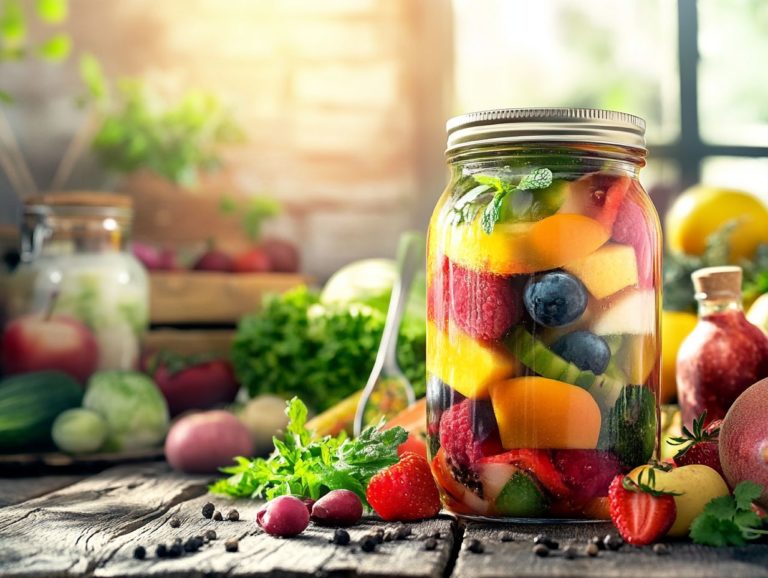Avoiding Overprocessing in Canned Goods
Canned goods provide undeniable convenience, yet not all options are created equal.
Grasping the concept of overprocessing is crucial for making healthier selections in your pantry. This exploration delves into what overprocessing entails, its implications for nutrition, and how to spot common harmful additives.
It also addresses the health risks tied to overprocessed canned goods and offers practical advice for reading labels effectively. You’ll find alternatives and discover the numerous benefits of incorporating whole foods into your diet, empowering you to make informed choices for your health.
Contents
- Key Takeaways:
- Understanding Overprocessing in Canned Goods
- Common Overprocessed Ingredients
- Health Risks of Overprocessed Canned Goods
- How to Avoid Overprocessing in Canned Goods
- Alternatives to Overprocessed Canned Goods
- Incorporating Whole Foods into Your Diet
- Frequently Asked Questions
- What is overprocessing in canned goods?
- Why is it important to avoid overprocessing in canned goods?
- How can I tell if a canned good has been overprocessed?
- What are some ways to avoid overprocessing in canned goods?
- Can overprocessing in canned goods be harmful to my health?
- Are there any other benefits to avoiding overprocessing in canned goods?
Key Takeaways:

- Avoid overprocessing in canned goods to maintain better nutrition and reduce harmful additives.
- Be mindful of ingredient labels, as overprocessed canned goods can have negative effects on your body.
- Choose fresher, less processed options, like fresh or frozen alternatives, to cut down on processed foods.
Understanding Overprocessing in Canned Goods
Understanding overprocessing in canned goods is essential for anyone who values food quality and nutritional integrity. Overprocessing refers to excessive cooking or the use of harmful additives, which can shorten the shelf life of canned products. To learn more about how to make canned goods last longer and maintain their nutrient retention, it’s important to be informed.
This can lead to nutrient loss. Therefore, it s crucial to identify signs of overprocessing, such as the presence of spoilage agents. Knowing the differences between high-acid foods (foods that tend to spoil quicker) and low-acid foods (foods that last longer) empowers you to choose wisely among canned items.
Definition and Impact on Nutrition
Overprocessing means excessive treatment of food, significantly reducing its nutritional value and overall quality. This happens when food undergoes more steps than necessary, often involving prolonged heat exposure, chemical additives, and mechanical processing.
While these methods aim to enhance shelf life and eliminate pathogens, they can inadvertently lead to a loss of essential nutrients, particularly vitamins and minerals. This is especially noticeable in canned foods, where rigorous processing can strip away moisture and dilute vital nutrients, ultimately making the final product less beneficial for you.
As a result, you might miss out on the important nutrition that fresh and minimally processed foods offer, which can significantly impact your overall health and wellness.
Common Overprocessed Ingredients
Beware! Common overprocessed ingredients can sneak into your canned foods, packed with additives that affect your health.
These additives may introduce spoilage agents that compromise food safety, raising concerns about the quality of what you consume.
Identifying Harmful Additives
Identifying harmful additives in canned foods is crucial for protecting your health against the adverse effects of overprocessing.
Many canned products contain additives like sodium benzoate and artificial flavors to enhance taste and extend shelf life. However, this convenience can come at a hidden cost. High sodium levels can lead to hypertension, while certain artificial flavors may trigger allergic reactions in sensitive individuals.
The overprocessing of food can strip away essential nutrients, compromising both safety and quality. When you reach for those canned soups or vegetables, you might be unknowingly ingesting chemicals that could pose long-term health risks. This highlights the need to be aware of what goes into your food choices.
Health Risks of Overprocessed Canned Goods

Overprocessed canned goods present various health risks you should be aware of. These include significant nutrient loss and a decline in food quality, which can ultimately lead to serious conditions such as botulism if not handled with care.
Take charge today! Check your pantry for overprocessed items and choose fresh options for a healthier life.
Possible Negative Effects on the Body
Consuming overprocessed foods can have a range of negative effects on your body, including impaired digestion and a lack of nutrients. These issues arise, in part, because such foods are often loaded with additives, preservatives, and sugars, which can inhibit your body s ability to absorb essential nutrients.
For example, if your diet leans heavily on canned soups or pre-packaged meals, you might find yourself missing out on vital vitamins and minerals, potentially leading to conditions like anemia or a weakened immune system.
The overprocessing of these foods strips away important fiber, which is essential for healthy digestion. As a result, you may experience uncomfortable issues such as bloating and constipation.
Long-term effects can include gastrointestinal disorders. Ultimately, relying on convenience items can compromise your overall health and well-being. It s essential to make whole foods a priority.
How to Avoid Overprocessing in Canned Goods
To prevent overprocessing in canned goods, you should adhere to essential storage guidelines and master the art of reading labels to pinpoint healthier choices. Additionally, familiarizing yourself with key tips for understanding the canning process can enhance your canning skills.
Tips for Reading Labels and Choosing Healthier Options
Reading labels with care is essential when shopping for canned foods; it gives you the power to select healthier options free from harmful additives.
By examining the ingredient list, you can swiftly spot unwanted preservatives and artificial flavors that might compromise your health. It’s crucial to pay close attention to the nutritional facts, as this section provides valuable insight into calorie counts, sugar, and sodium content key factors for maintaining a balanced diet.
A helpful tip is to choose products with fewer ingredients. These tend to indicate fresher and less processed options. Making informed choices while navigating food labels is essential for elevating your overall nutrition and leading to improved health outcomes.
Alternatives to Overprocessed Canned Goods
Exploring alternatives to overprocessed canned goods is essential for anyone aiming to prioritize their health. Fresh and frozen foods frequently emerge as superior choices.
These alternatives preserve more vitamins and minerals. This makes them a smart choice for health-conscious individuals.
Exploring Fresh and Frozen Options

Fresh and frozen options provide remarkable nutritional benefits and superior food quality when compared to overprocessed canned goods.
Opting for fresh fruits and vegetables or flash-frozen varieties allows you to enjoy peak flavors and nutrient profiles, unlike canned items that may be laden with preservatives or excessive sodium.
Don t let common traps catch you off guard when selecting canned products! Be vigilant about checking for added sugars and unhealthy fats, which can undermine your overall health. By making more nourishing decisions, you can ensure a healthier diet.
Make the switch today to a healthier diet!
Incorporating Whole Foods into Your Diet
Incorporating whole foods into your diet is an essential step toward elevating the quality of your meals and optimizing your nutritional intake. This approach significantly reduces your reliance on processed options, allowing you to nourish your body with the best nature has to offer.
Benefits of Eating Less Processed Foods
Eating less processed food can significantly enhance your overall health, improving your diet and the quality of what you consume.
When you prioritize whole, unprocessed foods, you re likely to notice a range of positive health changes. These include increased energy levels and sharper mental clarity. This shift in your diet aids in weight management by encouraging healthier calorie choices and boosting your intake of essential nutrients, such as vitamins and minerals often lost during food processing.
A diet rich in unprocessed foods improves digestive health by increasing your fiber intake. Fiber supports regularity and alleviates gastrointestinal issues. Ultimately, embracing less processed foods can pave the way for a healthier lifestyle and more fulfilling meals. Start today by swapping one processed item for a whole food!
Frequently Asked Questions
What is overprocessing in canned goods?
Overprocessing in canned goods refers to exposing the food to high temperatures and prolonged cooking time, which can lead to issues like dealing with overcooked canned fruits, resulting in a loss of nutrients and flavor.
Why is it important to avoid overprocessing in canned goods?
Avoiding overprocessing in canned goods is vital because it preserves the nutritional value and taste of the food. For more tips on preventing spoilage in your canned goods, ensuring consumers receive the full benefits and enjoyment of the product is essential.
How can I tell if a canned good has been overprocessed?
Overprocessed canned goods may have a mushy texture, a loss of color, and may taste bland or have an off-flavor. These signs indicate that the food has been exposed to high temperatures for too long, compromising food quality and shelf life. To avoid this, it’s important to learn about understanding the canning process for beginners.
What are some ways to avoid overprocessing in canned goods?
To avoid overprocessing, follow recommended processing times and temperatures, use high-quality ingredients like fresh tomatoes, fruits, and vegetables, and avoid overfilling the cans. Additionally, knowing how to handle canned food after processing is important to prevent overcooking and can corrosion.
Can overprocessing in canned goods be harmful to my health?
While overprocessing may not directly harm your health, it can result in a loss of important nutrients, decreasing the overall quality and taste of the food. This can make the food less enjoyable to eat and potentially lead to a less nutritious diet.
Are there any other benefits to avoiding overprocessing in canned goods?
Avoiding overprocessing in canned goods not only preserves nutritional value and taste but also helps reduce food waste. To achieve this, it’s important to learn how to avoid burning canned goods, which promotes sustainable practices in the food industry, such as using proper storage guidelines and recognizing spoilage warning signs like bulging lids.






